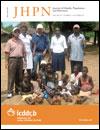Change of Diet, Plasma Lipids, Lipoproteins, and Fatty Acids during Ramadan: A Controversial Association of the Considered Ramadan Model with Atherosclerosis Risk
DOI:
https://doi.org/10.3329/jhpn.v29i5.8902Keywords:
Atherosclerosis, Diet, Fasting, Fatty acids, Lipoproteins, Ramadan, TunisiaAbstract
Different Islamic populations have different alimentary habits, notably during Ramadan. The paper reports the change of diet, lipids, and lipoproteins produced during Ramadan in one Tunisian population. During Ramadan, the study subjects consumed more proteins, cholesterol, vitamin E (p<0.01), and polyunsaturated fatty acids (p<0.05). At the same time, they exhibited an increase in total cholesterol, low-density lipoprotein-cholesterol (p<0.01) and apoprotein B (p<0.05) and a decrease in the ratio of apoprotein AI to apoprotein B (p<0.01). All assayed saturated fatty acids were unaffected by Ramadan fasting while three unsaturated fatty acids (C18:1cis9, C18:2n-6, and C30:4n-6) increased significantly. A return to the habitual diet for a four-week period was not sufficient to restore the pre-fasting patterns. For the study subjects, Ramadan was clearly associated with a change of diet and biochemical profile but its effective impact on atherosclerosis risk was unclear, perhaps, because other non-alimentary changes ought to be considered too. Future studies considering the no-alimentary factors, such as sleep and physical activity, would be useful to clarify the contribution of dietary change in the observed modification of biological profile.
Key words: Atherosclerosis; Diet; Fasting; Fatty acids; Lipoproteins; Ramadan; Tunisia
DOI: http://dx.doi.org/10.3329/jhpn.v29i5.8902
JHPN 2011; 29(5): 486-493
Downloads
1001
721

